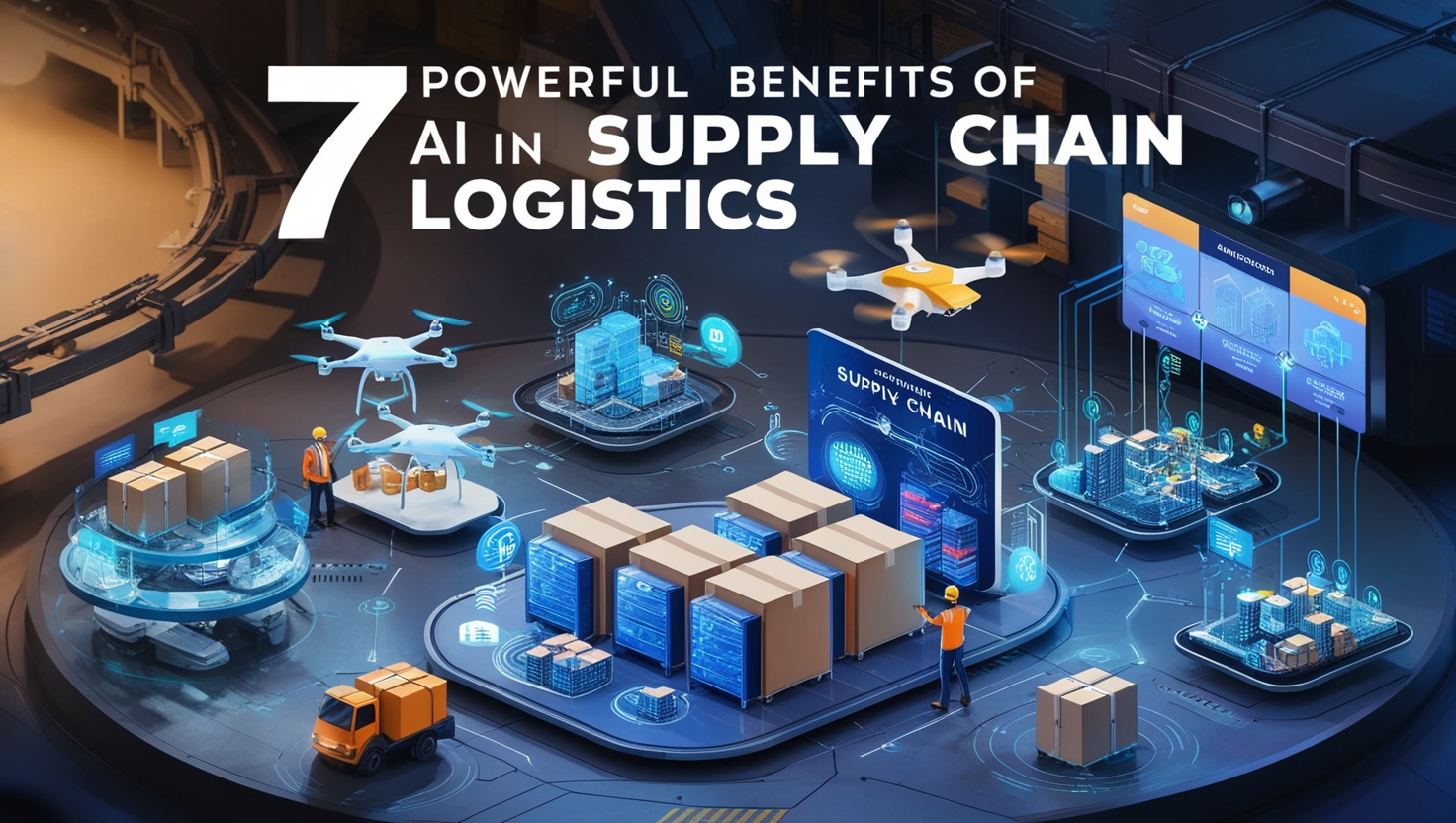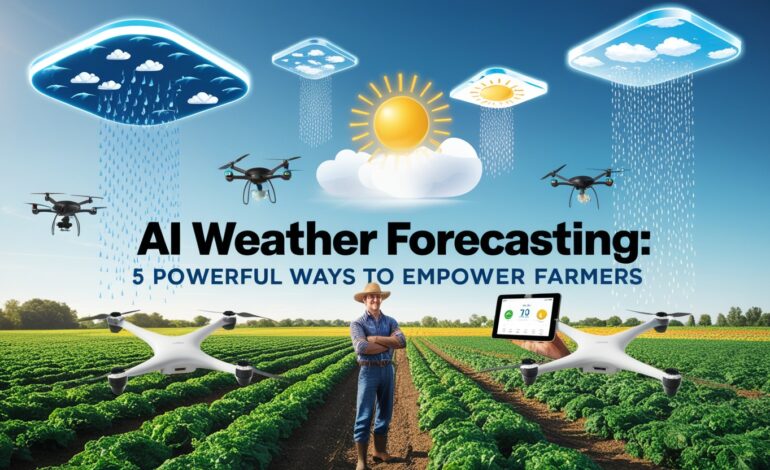
Don’t know that AI increases global crop yields by as much as 67%? This just goes on to show how massive a transformation AI is bringing to farming. that to me is how it is transforming how farmers handle the weather and enhancing their work.
With the help of AI weather forecasting, farmers have been able to predict their daily operations accurately and as a result greatly minimize the damages to crops. By using this advanced technology, farmers can now look forward to changes in weather patterns with incredible precision and it also changes most conventional current methods of farming.
They will consider how artificial intelligence improves the probability of a prediction in weather especially to the farmers in the United States. That’s why it provides them with means to increase agricultural production, to apply resources effectively, and be more environmentally friendly. There are five instances in which AI is being used to improve farming, as we will demonstrate below.
Table of Contents
ToggleIntroduction to AI Weather Forecasting
The world of agriculture is dynamic and unpredictable, and with proper forecasts, that’s good. They require them for crop selection and planting; for irrigation; and for all aspects of farm management. One of the biggest benefits of applying machine learning and smart farming is that farmers are finally receiving accurate climate data.
The Importance of Accurate Weather Predictions
In precision agriculture, weather data is critically important and, therefore, there is need to forecast the weather with a high degree of precision. They assist farmers in plotting issues to do with planting, use of water and control of pests. This results in high yield and consequently reduced losses. Also, they can work on other preparations for storms, diseases affecting both crops and animals.
AI's Role in Enhancing Forecasting Capabilities
AI is revolutionalising weather prediction. There are many parameters predicated from satellites, sensors, and history which help in providing accurate outcomes for AI algorithms. This will mean farmers have an opportunity to make wiser decisions on behalf of their precision agriculture.
| Metric | Traditional Forecasting | AI-Powered Forecasting |
|---|---|---|
| Accuracy | 70-80% | 90-95% |
| Spatial Resolution | 10-15 km | 1-3 km |
| Forecast Horizon | 7-10 days | 14-21 days |
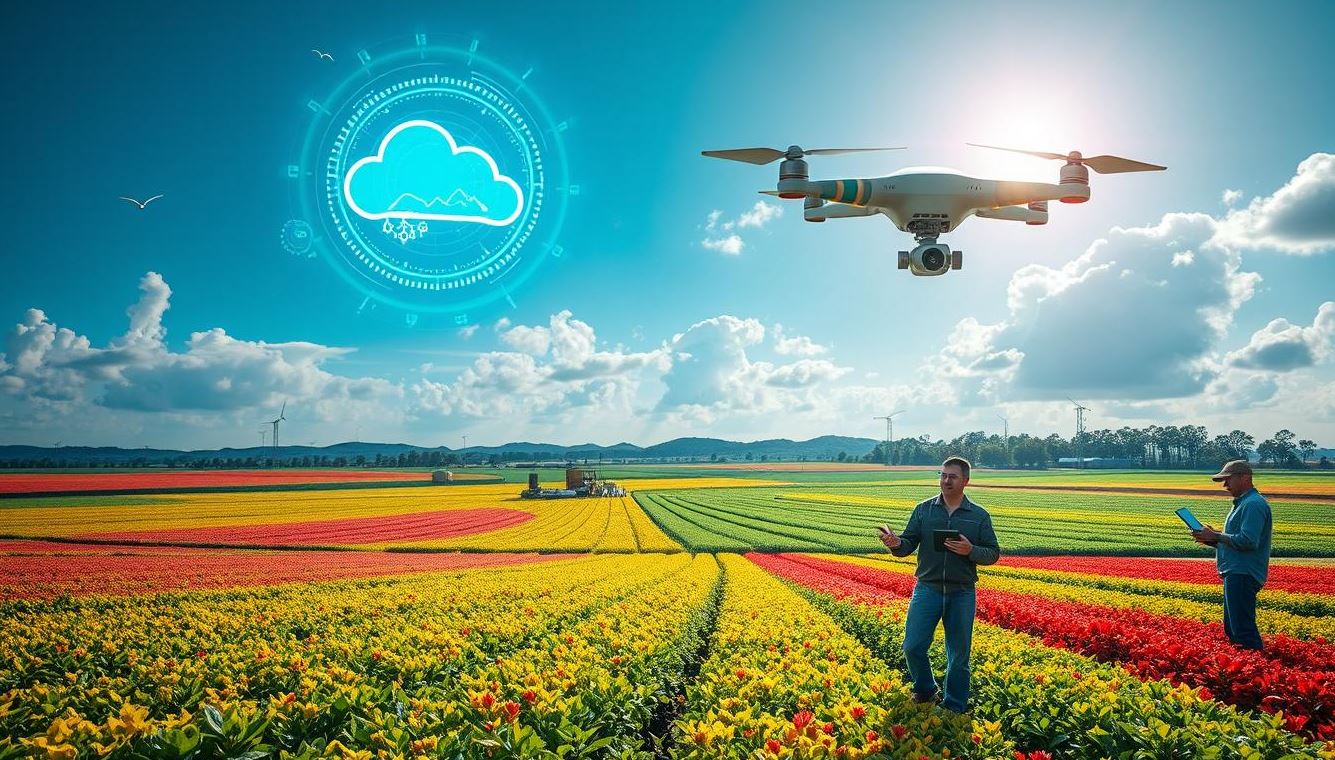
Machine Learning Predictions for Precision Agriculture
Quick and steady progress of advancement in technology has significantly impacted on the farming industry as machine learning alters the way crop is handled. It is used to enhance effective practices that facilitates precision agriculture with the help of precise analytics. This makes it easier for the farmers to use data to arrive at concrete decisions.
This sort of Continual Reengineering of Complex Traditional Endeavours is great at making forecasts in the weather. There are efficient algorithms for weather prediction as applied by the modern AI systems. It enables farmers to make better estimates of planting , irrigation and pest control; hence producing better yields.
| Metric | Traditional Forecasting | Machine Learning-Powered Weather Predictions |
|---|---|---|
| Accuracy | 70-80% | 90-95% |
| Lead Time | 5-7 days | 10-14 days |
| Granularity | Regional | Hyper-local |
It also assists farmers in planning, through machine learning algorithms. In other words, it analyses historical performance, the external structure, and the market conditions. This provides farmers with information on how they can make better farming and get more from there crops.
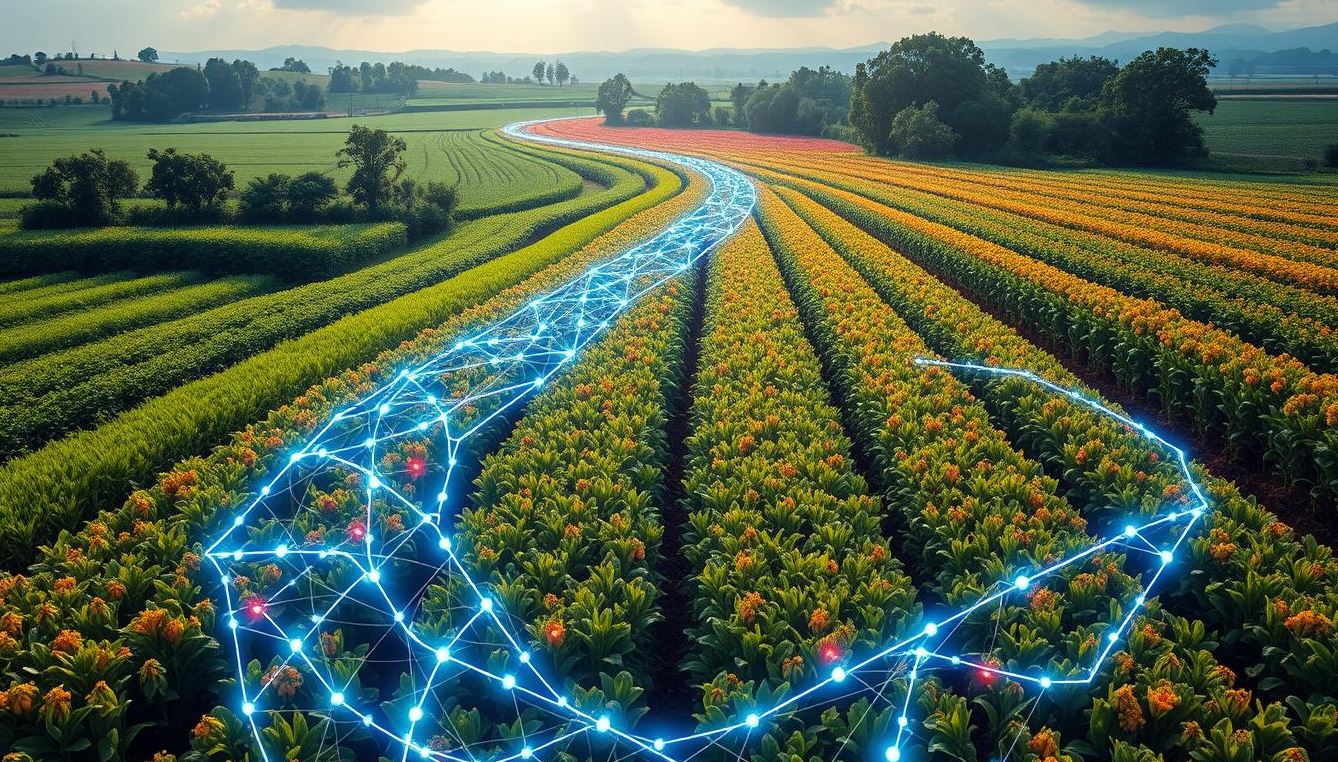
AI Weather Forecasting:
5 Powerful Ways to Empower Farmers
AI weather forecasting is changing the game for farmers. It gives them new insights and tools. This tech helps farmers grow more crops and use water better. Let’s look at five ways AI is helping farmers.
Predictive Modeling for Crop Yield Optimization
Farmers can now predict crop yields with great accuracy thanks to AI. This lets them plan better and get more from their harvests. By using climate analytics for yield optimization, farmers can adjust to weather changes. This makes their farms more productive and profitable.
Smart Irrigation and Water Management
AI weather forecasting is also changing how farmers use water. With smart farming technologies, they can track soil moisture and water use. This helps farmers use less water and save money. It’s good for the planet too.
| AI-Powered Benefits for Farmers | Impact |
|---|---|
| Predictive Crop Yield Modeling | Improved productivity and profitability |
| Smart Irrigation and Water Management | Reduced water consumption and operational costs |
| Pest and Disease Forecasting | Proactive mitigation and enhanced crop health |
| Precision Planting and Harvesting | Increased efficiency and resource optimization |
| Livestock Management and Welfare | Improved animal health and productivity |
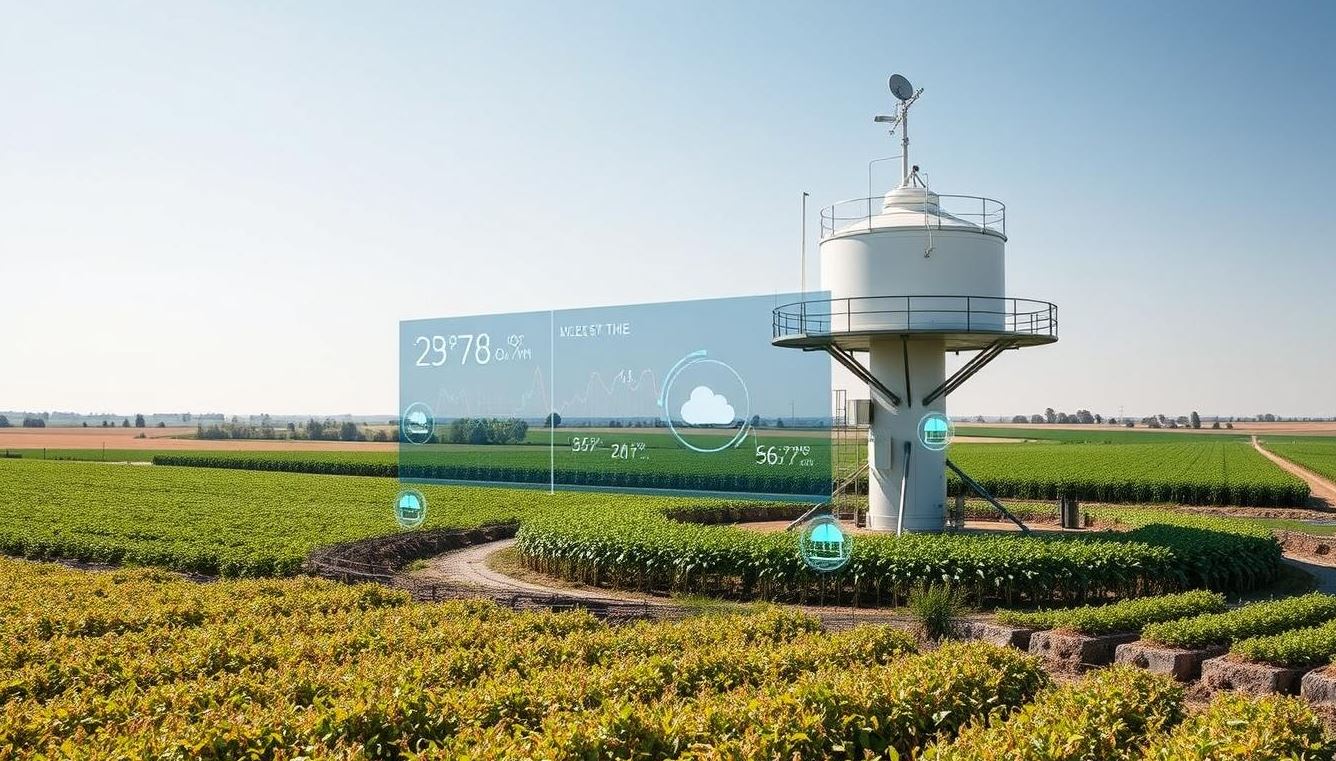
Data-Driven Crop Management Strategies
Data-driven crop management is changing farming. It uses sensor-based monitoring systems and climate analytics. This helps farmers make better choices and get more from their crops.
Sensor-Based Monitoring Systems
Modern sensors have changed how farmers get and use data. They track soil moisture, nutrient levels, and more. This info helps farmers adjust their farming to improve results and use resources better.
Climate Analytics for Yield Optimization
Climate analytics and AI weather forecasting help farmers understand their crops better. They use past weather and predictions to plan for the future. This way, farmers can make smart choices to get the most from their land.
| Metric | Improvement with Data-Driven Crop Management |
|---|---|
| Crop Yield | 20% increase |
| Water Usage | 15% reduction |
| Fertilizer Application | 18% decrease |
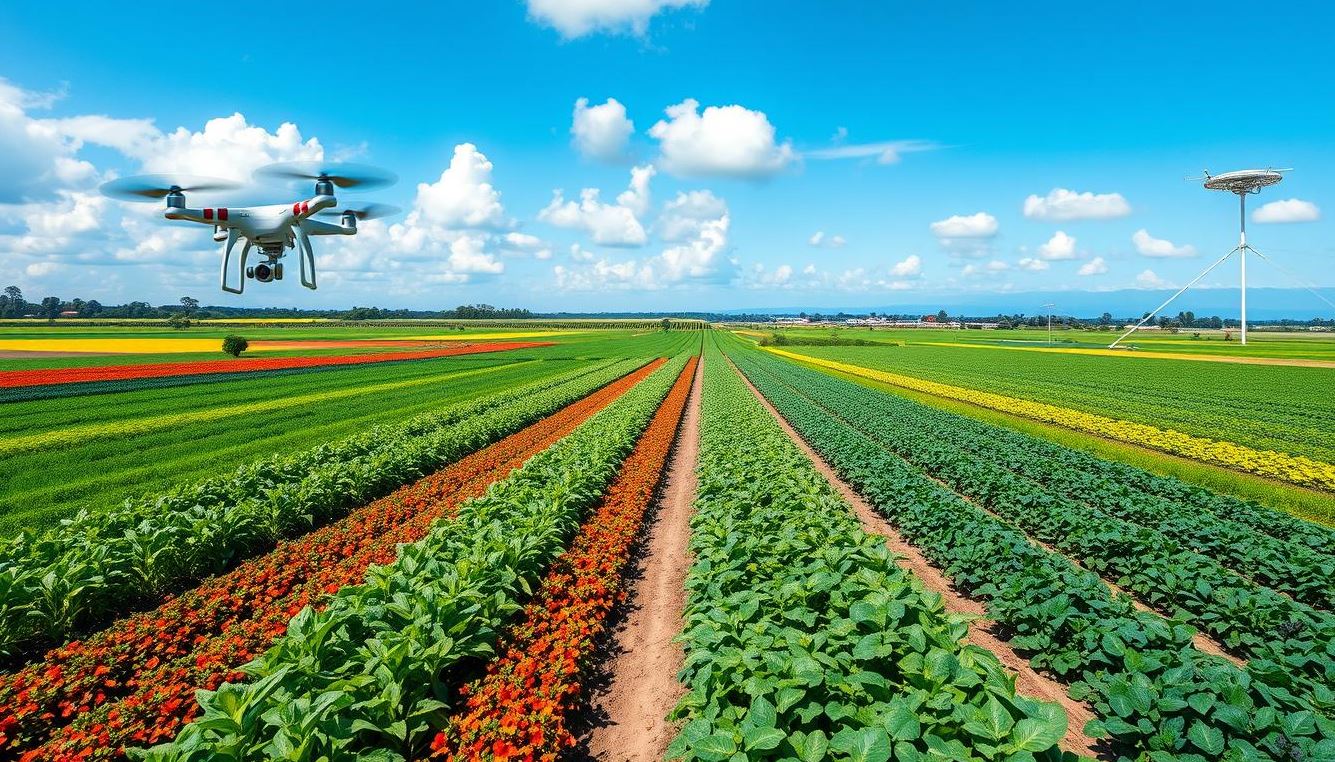
Data-Driven Crop Management Strategies
Agriculture is transforming rapidly with smart farming technologies and AI. They assist farmers to work better, produce more yield and overcome many complications in today’s farming. They add more accuracy and productivity to farming.
Precision irrigation is among the most important AI techniques applied in farming. Each one of them incorporate AI to forecast weather, to measure humidity of the soil, to manage water consumption. It saves water on the field, that allows farmers to cultivate more produce, and makes farming less destructive on the land.
Another big change is autonomous farming equipment. Self-driving tractors and harvesters are used to reduce the cost of operation while increasing production. They use AI to transport, to plant and to harvest fruits and crops so the farms could function efficiently and in a way that is constructive.
AI is also being adopted in how farmer combat diseases and other pests that affects their crops. Weather, soil, and crop condition is used by AI models to forecast diseases. It allows farmers to act early, apply less pesticides and protect more yields.
| Smart Farming Technology | Key Benefits |
|---|---|
| Precision Irrigation | Water conservation, increased crop yields, sustainable farming |
| Autonomous Farming Equipment | Increased efficiency, reduced labor costs, sustainable practices |
| Predictive Disease Detection | Early threat identification, reduced pesticide use, minimized crop losses |
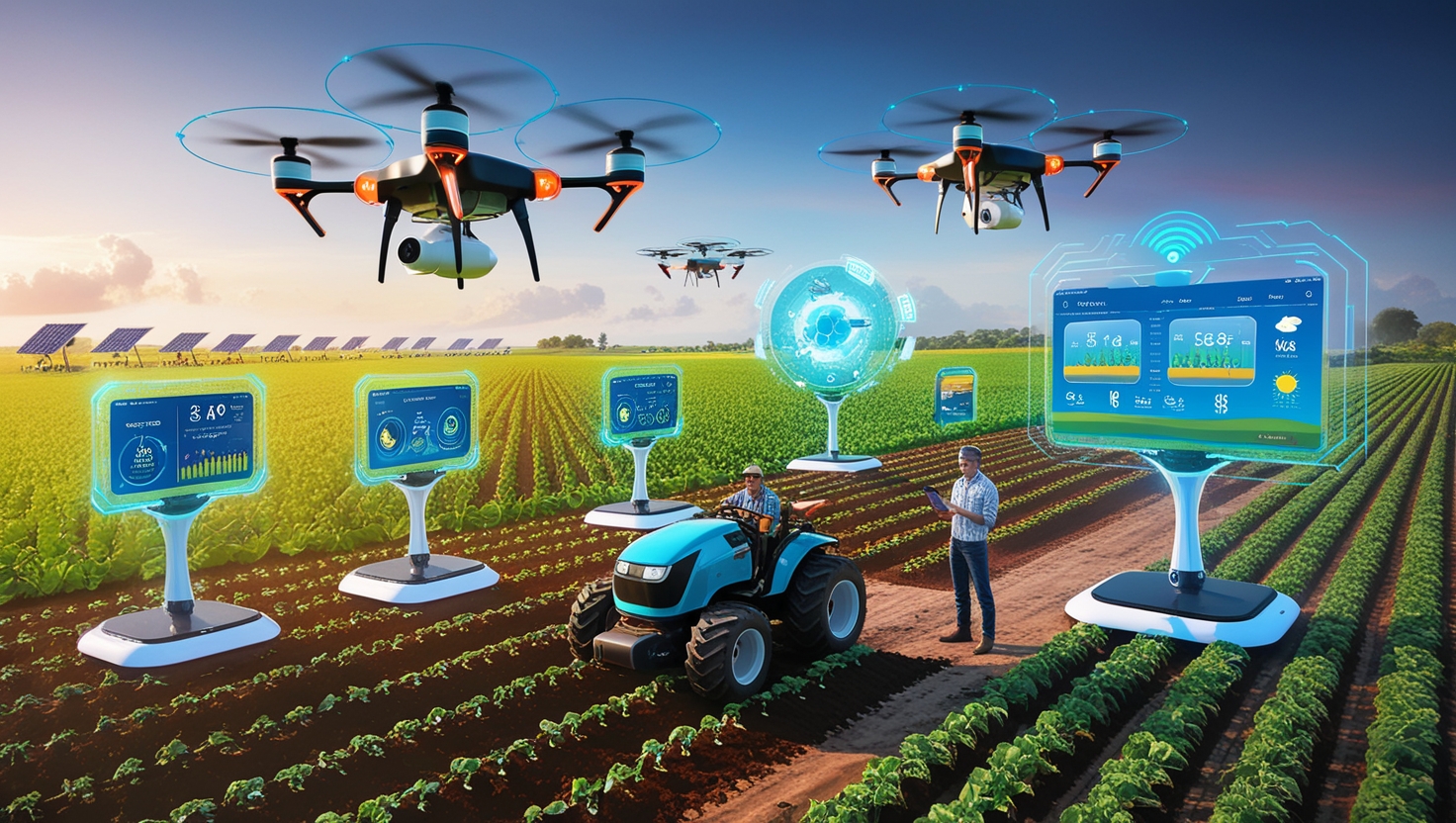
Agricultural AI Solutions for Sustainable Practices
In the current world, there are increased demands towards applying sustainability in producing agricultural foods. AI solutions are the only way to go. Peasants and specialists are employing unique approaches to reduce the influence of their produce on the surroundings as well as make the best utilization of available resources.
Reducing Environmental Impact
Specifically, AI in precision agriculture assists farmers in making financial returns to makes their processes environmentally friendly. Technology sensors and AI provides farmers with information on soil, water, and crops at the right time. This enables them to minimize on the use of pesticides, fertilizers and water in their farming.
Optimizing Resource Utilization
In the case of farmers AI is having a big impact on how they use resources. It follows data analysis and applications of predictive methods to assist the farmers in planning. This results into wise use of water energy and all the resources that are needed in farming, thus making it become more sustainable and cheaper.
FAQ
What is the role of AI in weather forecasting for farmers?
AI is changing how we forecast the weather. It gives farmers better and more reliable predictions. This helps farmers make smarter choices about their crops and how to use resources.
How does machine learning help with precision agriculture?
Machine learning helps farmers predict the weather. This lets them plan planting and make decisions based on data. It helps improve crop yields and use resources better.
What are the five powerful ways AI weather forecasting can empower farmers?
AI weather forecasting helps farmers in five key ways. It helps predict crop yields, manage water, and monitor conditions. It also supports sustainable farming and resource use.
How can sensor-based monitoring systems enhance data-driven crop management?
AI-powered sensors give farmers real-time data on the environment and soil. This data helps farmers make better decisions about irrigation and pest control. It leads to better crops and sustainability.
What are some examples of smart farming technologies powered by AI?
AI powers smart farming technologies like precision irrigation and autonomous equipment. It also helps detect diseases. These tools help farmers use resources wisely, reduce environmental impact, and increase yields.



